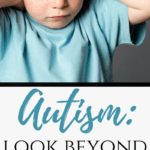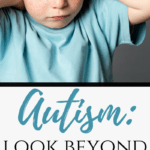
Autism: Look Beyond The Anger


Autism is something that 1:68 children battle every day. There’s something so important you’re missing and you need to know.


Autism: Look Beyond The Anger
Before you put your blinders on, and refuse to believe that Autism is real, or that it’s over-diagnosed, and say that the parents of autistic children need to discipline their children more, hear me out. I don’t have an autistic child, nor do I have someone close to me who is autistic. I am simply a human being who lives in the same world as millions of Autistic people and am doing my best to make their world easier to live in too.
I’m in a wonderful group on Facebook that’s a support group for Sensory Processing Disorder (SPD). I joined at the recommendation of a friend, after wondering if my daughter may have a mild case. Many Autistic children also have SPD. Since I joined the group several months ago, I’ve taken the time to read the stories, the frustrations, the ventings, and the emotional breakdowns of the parents of these Austistic kids. I read, I absorbed, and I learned.
Read more about understanding Autism in this book HERE.
Look for the Signs
A few days ago, I was helping at a large scale free toy shopping event my family puts on each year that gives out toys for Christmas for about 2500 kids. We allow the parents to come back to an area and shop for each of their children for Christmas. We have a children’s area up front and try to keep kids from coming back with their parents to ensure their Christmas presents can stay a surprise until Christmas morning.
As I was helping a mom get ready to shop, I noticed both her kids were still with her as she came back to the shopping area. I told her we had a kids area up front with a movie, that they were more than welcome to go hang out with our volunteers up there until she was finished. She told me that her son, who was about ten years old, would probably go, but her daughter, who was four, would throw a fit.
I used to teach Kindergarten, so I am really comfortable with that age group. I squatted down in front of that cute little blonde four year-old, with snot running from her nose, and I smiled and said, “Would you like to go play with me for a little bit while your Mommy shops for Christmas toys for you?” She smiled and nodded her head yes. I checked with her Mom to make sure that was okay, and she smiled a relieved smile and allowed us to go play.
We headed through the sea of people, toward the kid’s area where a Christmas movie was playing on a big screen. I asked her if she wanted to watch the Christmas movie, and she said she did, with a big smile on her face. As we got closer to the TV, where the movie was playing, the sea of people got more thick. We made it to the front row of chairs, and the little smiling blonde next to me furrowed her brow, covered her ears, climbed into a chair, tucked her knees to her chest and just glared at me.
DID YOU KNOW THAT SOME AUTISTIC CHILDREN ARE GIFTED? READ THE 9 THINGS YOU MAY NOT KNOW ABOUT GIFTED KIDS HERE.
Because of what I knew, and what I had read, I immediately knew she wasn’t angry with me, she was on absolute sensory overload. I bent down in front of the chair she was in and said, “Don’t you want to watch the movie?” Kids behind me ran on the stage, in front of the movie, randomly yelling, and screaming in out-of-control fun. The little blonde girl shook her head at me, and glared even harder, turning away from me with her ears still covered. I lowered my voice this time, recognizing how difficult this must have been for her brain to process and gently asked her if the noise was bothering her. She nodded her head this time, still glaring at me. I quietly and slowly asked her if she’d like to go some place more quiet. She nodded her head yes, and we retreated together. Once we made it a safe distance from the middle of the noise, I asked her if she’d like to sit at a table and color with me, and she uncovered her ears, turned to me with a huge smile and nodded her head.
We colored for about thirty minutes while her Mom shopped. She smiled the whole time and enjoyed herself! I sent her home with the picture she colored and a hug, and her Mom seemed relieved to know she was being happily returned to her without incident. She told me she was autistic and thanked me for watching her while she shopped.
That entire situation could have gotten out of control very quickly. Out of ignorance, I could have labeled her stubborn, rude, and misbehaved for how she acted, but the education I’ve gained over the last few months allowed me to react differently. I was able to respond to that little blonde girl out of empathy, and not out of ignorance. As a result, her Mom was able to Christmas shop, and that pretty little blonde girl was able to avoid a meltdown and enjoy thirty minutes coloring with a stranger.
What You Need to Know
People with Autism are often experiencing a much higher level of sensory input than we are. Oftentimes, sounds are louder and more intense, lights are brighter, people talking, moving, and jumping around them is overwhelming. While there are methods of coping with this, and there are people who function at high-levels who have Autism, that’s not always the case, especially in children who can’t or don’t know how to control how they react yet.
Imagine being shoved into a concert, with thousands of people on every side, music blaring so loud you can’t hear yourself think, and lights flashing so brightly that you feel dizzy and disoriented. As you try to cover your ears and escape, someone yells something you can’t understand and glares at you, pointing back toward the direction of the crowd.
Ignoring them, you push forward, willing yourself to get out of that situation. Soon, someone is restraining you, and you fight to re-gain control of your body, desperately trying to get away from the throbbing in your brain.
That’s how that crowded kid’s area with the movie felt to that little blonde girl, and how many autistic children and children with SPD in school at auditoriums, during fire drills, at school plays or concerts, or in the lunch room etc feel every day.
Read the ten things every Autistic child wishes you knew HERE.
Please. Educate yourself on Autism and SPD and learn to look beyond the meltdowns to what’s really going on inside their brain. They have a hard road to battle, and reacting to them out of ignorance isn’t going to make the world a better place. Learn to respond to the anger with gentleness and with love and you’d be surprised at what a difference that can make.




